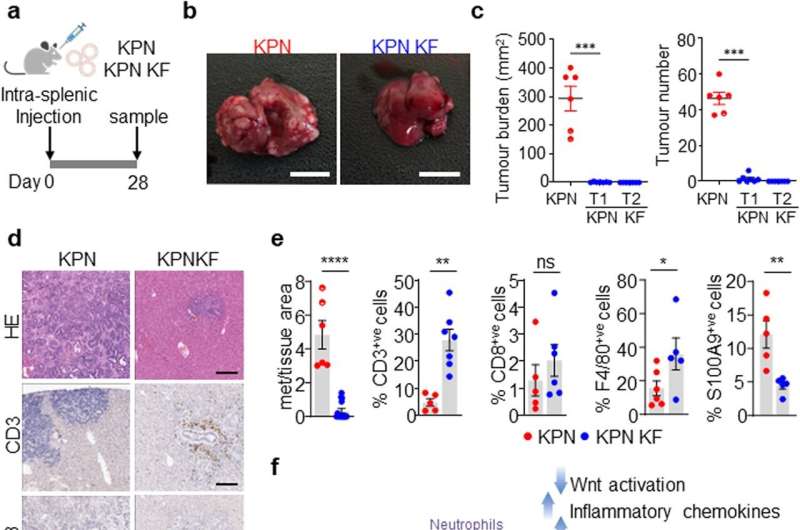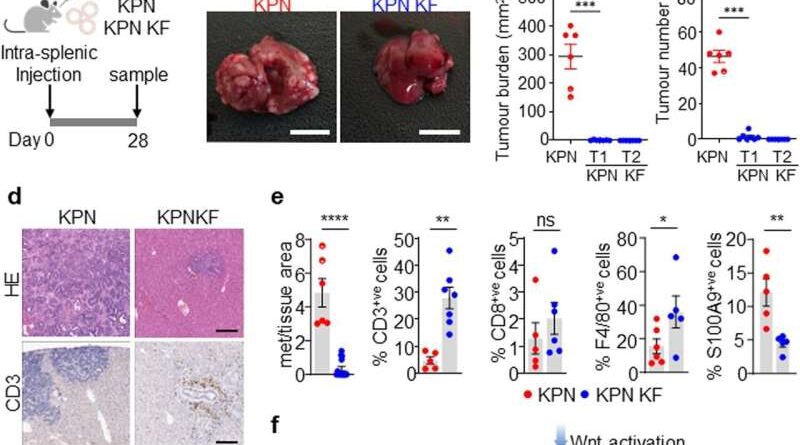Gene discovery paves way for advanced treatment of pancreatic and colorectal cancer

Kras-deficient KPN cells show reduced metastatic capacity and immune infiltration. Credit: Nature Communication (2024). DOI: 10.1038/s41467-023-44342-4
Recent research from the University of Helsinki sheds new light on the behavior of the KRAS gene in two of the deadliest types of pancreatic and colorectal cancer. These findings suggest potential avenues for targeted therapies in KRAS-driven cancers.
KRAS, a gene known to be mutated in various types of cancer, has more complex effects than previously understood. Although the role of mutated KRAS in cancer is known, this new work reveals the importance of the presence or absence of a normal, non-mutated form of KRAS.
The team, led by Dr. Arafath (Rafa) Najumudeen, studied the effect of KRAS on tumor initiation, progression, and response to treatment of pancreatic and colorectal cancer using mouse models and patient data.
Published in Cancer Research and Nature Communicationstudies show that loss of the normal KRAS gene can accelerate the growth of pancreatic and colorectal cancer. Interestingly, these tumors appear to be unable to metastasize.
“We found that the normal KRAS gene acts as a brake on cancer, blocking the effects of the KRAS gene that drives cancer growth,” says Dr. Rafa Najumudeen of the Finnish Institute of Molecular Medicine (FIMM) at the University of Helsinki, lead author of the study.
The results also suggest that when a patient’s pancreatic cancer loses the normal form of KRAS, the cancer becomes more sensitive to a type of drug called MEK inhibitors. This means that patients with certain genes—those who have lost the normal KRAS gene—may benefit from targeted drugs that can slow tumor growth.
“Our findings give us a better understanding of how different variants of the KRAS gene interact with cancer. More importantly, they provide a potentially effective treatment pathway.” for two very aggressive cancers,” added Dr. Najumudeen.
“These chemicals are often found in the background and are difficult to treat, making new discoveries important for improving patient outcomes. By targeting tumors with specific genes certain things, we can give patients a better chance of survival.”
Pancreatic and colorectal cancer are the leading causes of cancer-related deaths worldwide. This research opens up new possibilities for targeted therapies, which could lead to effective treatment for many cancer patients, not only in Finland but worldwide.
“KRAS has been the focus of intense international research for a long time, and many studies have focused on the biology of the KRAS gene that is mutated and inhibited by drugs. It is not just a bystander but plays an important role in cancer control and the effectiveness of drug treatments,” says Johanna Ovaska, Professor of Molecular Cell Biology at the University of Turku who was not involved in this study.
Additional information:
Sigrid K. Fey et al, KRAS Loss of Heterozygosity Promotes MAPK-Dependent Pancreatic Ductal Adenocarcinoma Initiation and Increases Therapeutic Sensitivity to MEK Inhibition, Cancer Research (2024). DOI: 10.1158/0008-5472.CAN-23-2709
Arafath K. Najumudeen et al, KRAS allelic imbalance drives tumor initiation but suppresses metastasis in colorectal cancer in vivo, Nature Communication (2024). DOI: 10.1038/s41467-023-44342-4
Offered by the University of Helsinki
Excerpt: Gene discovery paves way for advanced cancer treatment and colorectal cancer (2024, October 21) retrieved on October 21, 2024 from https://medicalxpress.com/ news/2024-10-genetic-discovery-paves-advanced-pancreatic.html
This document is subject to copyright. Except for any legitimate activity for the purpose of private study or research, no part may be reproduced without written permission. Content is provided for informational purposes only.
#Gene #discovery #paves #advanced #treatment #pancreatic #colorectal #cancer
